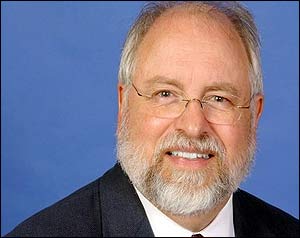
UO Independence
Bill has power over president, but not tuition
A bill being drafted by Eugene Rep. Phil Barnhart could create a transparent local UO board that’s appointed by the governor and/or elected and has the power to raise salaries and veto the firing of the UO president, but has very limited power to raise tuition.
 |
Barnhart said he’s been talking to other elected officials, a legislative attorney and UO student and faculty leaders in drafting the bill. “Nothing is final yet,” he said, inviting more input from the public.
But Barnhart said he has prioritized affordable tuition and public accountability in the change in governance. “I’m not interested in a private university,” he said, “not even a little bit.”
Barnhart laid out key provisions that may be included in a bill introduced later next month for possible passage in February. “Exactly how this is going to pan out, I don’t know,” he said.
A key provision in the bill would give the local board veto power to block the firing or hiring of a UO president, according to Barnhart. In turn, a state board, perhaps the governor’s new Education Investment Board, would also have the same hiring/firing veto power.
Barnhart said that to avoid “huge fights” in the Legislature, the UO board would still be under a state board when it comes to competing for state financing and borrowing authority and in establishing competing academic specialties.
Barnhart said the local UO governing board would improve the transparency of the current local decision making at the UO. Now, “the decisions get made by the president within Johnson Hall without much oversight,” he said. For example, Barnhart faulted former UO president Dave Frohnmayer for deciding to sell Westmoreland family housing without public input.
A board could offer public meetings, hearings, public notice of deliberations, transparency and public accountability to such decisions, Barnhart said.
But Barnhart said he’s heard concerns from students that a local board should not have a free hand to increase tuition and fees. “There’s a whole bunch of concern,” he said.
Barnhart said the Legislature or the governor’s statewide Investment Board could set caps on tuition and fee increases of perhaps 2 to 3 percent a year. “Tuition and fees need to be managed through a statewide organization,” he said.
The local board would be free to give raises to faculty and administrators, Barnhart said. In doing so they could balance faculty retention against faculty-student ratios, tuition costs and other funding issues, according to Barnhart. “Obviously there would have to be financial constraints,” he said.
Barnhart said he supported fired UO President Richard Lariviere’s raises for faculty, but as for the administrative raises, “I don’t know.”
How exactly the powerful local board would be selected is a “big discussion item” that hasn’t been decided, Barnhart said. “I think you could have the governor appoint all of them,” he said. That’s similar to the existing system with the state OUS board. But Barnhart said it would be different with a board focused on the UO.
Some or all of the UO board members could also be elected statewide, he said. Asked if people in Pendleton would know or care enough to vote, Barnhart said it would be no different than electing Oregon Supreme Court justices statewide.
Barnhart said some of the board members could also be elected by faculty members and/or students. “You could do that,” he said. “All those possibilities are on the table.”
Barnhart said the board should include diverse interests. “Obviously you don’t want the faculty running the whole thing, because that’s too narrow an interest,” he said. “You don’t want a board made up entirely of local athletic department boosters.”
He said unlike an earlier bill for an independent board the board he’s proposing would not self perpetuate by appointing many of its own members. “I don’t think that’s acceptable,” he said. Barnhart said he also hasn’t proposed a seat on the public board for the privately run UO Foundation.
Scandals have plagued independent but clueless and crony boards at Penn State, and corporations such as Enron have not provided much oversight of chief executives. But Barnhart said he wants the UO board to use its power to demand information and accountability from the UO president.
The new UO board could intervene in the president’s contract and hiring and firing decisions, Barnhart said. “This board has to take its accountability and transparency responsibilities seriously.”
|
|
|||||||
|
|
|||||||
|
Table of Contents | News | Views | Blogs | Calendar | Film | Music | Culture | Classifieds | Personals |
|||||||